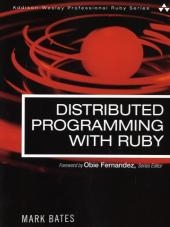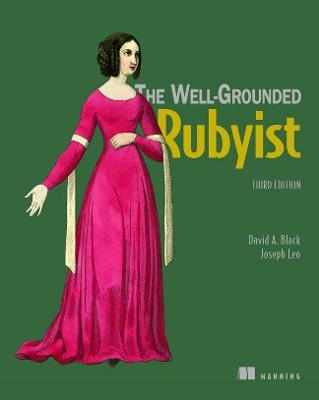
Distributed Programming with Ruby
Addison-Wesley Educational Publishers Inc (Verlag)
978-0-321-63836-6 (ISBN)
- Titel ist leider vergriffen;
keine Neuauflage - Artikel merken
Complete, Hands-On Guide to Building Advanced Distributed Applications with Ruby
Distributed programming techniques make applications easier to scale, develop, and deploy—especially in emerging cloud computing environments. Now, one of the Ruby community’s leading experts has written the first definitive guide to distributed programming with Ruby.
Mark Bates begins with a simple distributed application, and then walks through an increasingly complex series of examples, demonstrating solutions to the most common distributed programming problems.
Bates presents the industry’s most useful coverage of Ruby’s standard distributed programming libraries, DRb and Rinda. Next, he introduces powerful third-party tools, frameworks, and libraries designed to simplify Ruby distributed programming, including his own Distribunaut.
If you’re an experienced Ruby programmer or architect, this hands-on tutorial and practical reference will help you meet any distributed programming challenge, no matter how complex.
Coverage includes
• Writing robust, secure, and interactive applications using DRb—and managing its drawbacks
• Using Rinda to build applications with improved flexibility, fault tolerance, and service discovery
• Simplifying DRb service management with RingyDingy
• Utilizing Starfish to facilitate communication between distributed programs and to write MapReduce functions for processing
large data sets
• Using Politics to customize the processes running on individual server instances in a cloud computing environment
• Providing reliable distributed queuing with the low-overhead Starling messaging server
• Implementing comprehensive enterprise messaging with RabbitMQ and Advanced Message Queuing Protocol (AMQP)
• Offloading heavyweight tasks with BackgrounDRb and DelayedJob
Mark Bates has been developing web applications of one kind or another since 1996. He has spent an ungodly amount of time programming Java, but thankfully he discovered Ruby in late 2005, and life has been much nicer since. Since discovering Ruby, Mark has become a prominent member of the community. He has developed various open-source projects, such as Configatron, Cachetastic, Genosaurus, APN on Rails, and the Mack Framework, just to name a few. The Mack Framework brought Mark to the forefront of distributed programming in the Ruby community. Mack was a web framework designed from the ground up to aid in the development of distributed applications. Mark has taught classes on both Ruby and Ruby on Rails. He has spoken at several Ruby gatherings, including 2008’s RubyConf, where he spoke about building distributed applications. Mark has an honors degree in music from the Liverpool Institute for Performing Arts. He still likes to rock out on the weekends, but set times are now 10 p.m., not 2 a.m. He lives just outside of Boston with his wife Rachel and their sons Dylan and Leo, whom he missed very much when writing this book. Mark can be found at http://www.markbates.com and http://github.com/markbates.
Foreword ix
Preface xi
Part I Standard Library 1
Chapter 1 Distributed Ruby (DRb) 3
Hello World 4
Proprietary Ruby Objects 10
Security 17
Access Control Lists (ACLs) 18
DRb over SSL 21
ID Conversion 28
Built-in ID Converters 29
Building Your Own ID Converter 33
Using Multiple ID Converters 34
Conclusion 35
Endnotes 36
Chapter 2 Rinda 37
“Hello World” the Rinda Way 38
Understanding Tuples and TupleSpaces 44
Writing a Tuple to a TupleSpace 44
Reading a Tuple from a TupleSpace 45
Taking a Tuple from a TupleSpace 48
Reading All Tuples in a TupleSpace 52
Callbacks and Observers 53
Understanding Callbacks 54
Implementing Callbacks 55
Security with Rinda 59
Access Control Lists (ACLs) 59
Using Rinda over SSL 61
Selecting a RingServer 63
Renewing Rinda Services 70
Using a Numeric to Renew a Service 71
Using nil to Renew a Service 72
Using the SimpleRenewer Class 72
Custom Renewers 73
Conclusion 75
Endnotes 76
Part II Third-Party Frameworks and Libraries 77
Chapter 3 RingyDingy 79
Installation 79
Getting Started with RingyDingy 80
“Hello World” the RingyDingy Way 81
Building a Distributed Logger with RingyDingy 82
Letting RingyDingy Shine 84
Conclusion 86
Chapter 4 Starfish 87
Installation 87
Getting Started with Starfish 88
“Hello World” the Starfish Way 90
Using the Starfish Binary 90
Saying Goodbye to the Starfish Binary 93
Building a Distributed Logger with Starfish 96
Letting Starfish Shine 99
MapReduce and Starfish 103
Using Starfish to MapReduce ActiveRecord 104
Using Starfish to MapReduce a File 110
Conclusion 112
Endnotes 113
Chapter 5 Distribunaut 115
Installation 116
Blastoff: Hello, World! 117
Building a Distributed Logger with Distribunaut 120
Avoiding Confusion of Services 123
Borrowing a Service with Distribunaut 126
Conclusion 128
Endnotes 129
Chapter 6 Politics 131
Installation 133
Working with Politics 135
Conclusion 141
Endnotes 142
Part III Distributed Message Queues 143
Chapter 7 Starling 145
What Is a Distributed Message Queue? 145
Installation 147
Getting Started with Starling 148
“Hello World” the Starling Way 155
Building a Distributed Logger with Starling 157
Persisted Queues 158
Getting Starling Stats 158
Conclusion 162
Endnotes 162
Chapter 8 AMQP/RabbitMQ 163
What Is AMQP? 163
Installation 165
“Hello World” the AMQP Way 167
Building a Distributed Logger with AMQP 178
Persisted AMQP Queues 180
Subscribing to a Message Queue 184
Topic Queues 187
Fanout Queues 193
Conclusion 196
Endnotes 197
Part IV Distributed Programming with Ruby on Rails 199
Chapter 9 BackgrounDRb 201
Installation 202
Offloading Slow Tasks with BackgrounDRb 203
Configuring BackgrounDRb 211
Persisting BackgrounDRb Tasks 213
Caching Results with Memcached 217
Conclusion 220
Endnotes 221
Chapter 10 Delayed Job 223
Installation 223
Sending It Later with Delayed Job 225
Custom Workers and Delayed Job 230
Who’s on First, and When Does He Steal Second? 235
Configuring Delayed Job 237
Conclusion 240
Endnotes 241
Index 243
| Erscheint lt. Verlag | 12.11.2009 |
|---|---|
| Reihe/Serie | Addison-Wesley Professional Ruby Series |
| Verlagsort | New Jersey |
| Sprache | englisch |
| Maße | 177 x 229 mm |
| Gewicht | 422 g |
| Themenwelt | Informatik ► Programmiersprachen / -werkzeuge ► Ruby |
| Informatik ► Software Entwicklung ► Objektorientierung | |
| ISBN-10 | 0-321-63836-0 / 0321638360 |
| ISBN-13 | 978-0-321-63836-6 / 9780321638366 |
| Zustand | Neuware |
| Haben Sie eine Frage zum Produkt? |
aus dem Bereich
